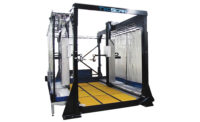NDT Applications: Demand Increases for Product Miniaturization

The Mini Series of lead screws from Kerk Motion Products is used in the borescope designed by Car Engineering. Source: Kerk Motion Products
Machines that perform advanced product testing have become an essential element in product quality testing for a wide range of industries. From the automotive industry to HVAC manufacturers, countless products and parts have to be tested in order to meet increasingly strict specifications and be granted the positive end of the accept/reject option. In fact, for many suppliers to the automotive industry, product testing is an integrated part of production; 100% of their parts are tested against various regulatory standards to meet quality requirements that are just as important as the price or design of the product.
As a result of this trend toward advanced product testing, Car Engin-eering (Victor, NY), a multidisciplinary, high-precision engineering and machine shop, has experienced a considerable boost in requests for nondestructive pre-tested products from manufacturers across the board, including aerospace, automotive, medical and military industries.
"Engineering and testing capacity is what customers want and truly value," says John Pickering, president of Car Engineering. "We not only have the ability to fabricate and test parts in-house, but we can assemble entire subassemblies and test them as well. Consequently, we can identify weak performance issues quickly and offer cost-effective design refinements. These design, build and testing services have become a significant part of Car's revenue stream-as much as 20%."
Recently Car was faced with designing a positioning mechanism for a manufacturer of remote visual inspection equipment. Used for detecting subtle irregularities within castings and complex assemblies, an optical borescope can ensure the structural integrity of a complex aircraft engine, or diagnose a simple cause of an automobile squeak or rattle.
It was crucial that Car Engineering develop a cutting-edge product of the highest quality and with the most modern and sleek design. Not only was Car striving for a unique design that would offer improved performance and efficiency, their customer also sought to "miniaturize" the overall size of the end-product. Car's challenge was to create a solution that was both first-rate and cost-effective. Knowing that miniature components are expensive and require a high level of precision, Car needed to find a design partner that could provide cost-effective components and still meet these stringent quality specifications.

An engineering test technician runs diagnostics on an automotive application using an improved optical borescope. Source: Kerk Motion Products
"Our analysis confirmed that Kerk's products were much more cost-effective than the competition and far superior in terms of both delivery and engineering support," Pickering says. "Partnering with Kerk allowed us to provide a broader range of capabilities than we could offer using other sources."
The engineering backbone of the advanced borescope is Kerk's Mini Series of lead screws, which are made of 303 stainless steel. Comprised of small diameter, precision rolled, lead screw components, the Mini Series provides reliable precision motion control at as little as one-tenth the cost of miniature ball screws.
The new borescope uses four lead screws simultaneously, resulting in both a clockwise and counterclockwise direction within the subassembly, thus loosening one or two of the "positioning leads" and tightening the balance.
"The miniature lead screws allowed us to create a mechanical subassembly that gives our borescope the high precision and superior efficiency we were looking for," Pickering says.
Built to survive hundreds of millions of inches of travel without requiring external lubrication, maintenance or adjustment, Kerk's Mini Series is constructed with proprietary, Kerkite composite polymer material. Kerkite products are compounded with lubricants, reinforcements and thermoplastic polymers formulated to provide optimum performance in its target conditions and applications.
The Kerkite polymer material was a key element to the success of this particular application because, unlike typical miniature subassembly applications, the borescope required an especially high load capacity and an extremely smooth motion.
"A key advantage is design flexibility and material selection," says David Arguin, sales manager at Kerk Motion Products. "The Kerkite material allows for a longer product wear life and is capable of meeting the high speeds and loads that this application requires."
The borescope lens is now capable of providing 25% more articulation and Car was able to reduce the size of the motion control sub-assembly by about 50%, resulting in a much smaller overall design. The final product is currently in its last build and expected to be in full-production, with about 2,000 units annually, by April 2006.
"We are extremely pleased with the end result. Kerk's Mini Series has exhibited outstanding performance, allowing new designs and unique concepts to be developed at previously unattainable sizes and costs," Pickering says.
Kerk Motion Products
(603) 465-7227
Benefits
- Comprised of small diameter, precision rolled, lead screw components, the Mini Series provides reliable precision motion control at as little as one-tenth the cost of miniature ball screws.
- The new borescope uses four lead screws simultaneously, resulting in both a clockwise and counterclockwise direction within the subassembly, thus loosening one or two of the "positioning leads" and tightening the balance.
- The Kerkite polymer material was a key element to the success of this particular application because, unlike typical miniature subassembly applications, the borescope required an especially high load capacity and an extremely smooth motion.
- The borescope lens is now capable of providing 25% more articulation, and Car Engineering was able to reduce the size of the motion control subassembly by about 50%, resulting in a smaller overall design.
Looking for a reprint of this article?
From high-res PDFs to custom plaques, order your copy today!



